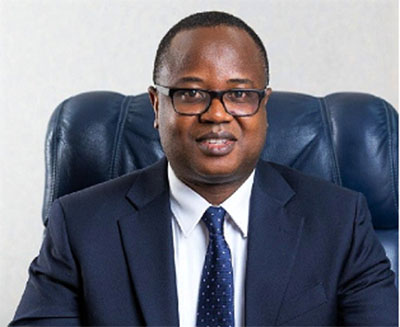Dr. Maxwell Opoku-Afari
MAXWELL OPOKU-AFARI, 1st Deputy Governor of the Bank of Ghana, has indicated that Ghana’s infrastructure needs are about $7 billion annually over the next 10 years.
Speaking at a public lecture Thursday at the University of Ghana Business School (UGBS) on the theme: “Re-Thinking Development Financing: Macroeconomic Management When The Love Is Gone,” he said such was the kind of investment needed to push Ghana into the upper-middle income class.
But, he was quick to add that there were constraints. “And I must say that these are staggering numbers which will require a new paradigm shift in the way we finance development. As we think of how we finance these projects, we need to be conscious of the fact that we also faced a major constraint — an optimisation problem requiring us to control total public debt exposure to ensure high debt levels do not constrain growth and poverty reduction efforts.”
Indicating that there was the need to enhance efficiency of public spending, expenditure rationalisation, and value for money projects that would deliver projects more efficiently, Dr. Opoku-Afari said, “No matter the efforts we make towards enhancing domestic revenue mobilisation, we will continue to experience chronic fiscal deficits and a growing debt burden, if we do not take steps to rationalise our expenditure levels. The high levels of government spending required to close the huge infrastructure deficit and debt are limiting fiscal room for maneuver. This therefore calls for the kind of fiscal consolidation that involves both revenue-raising measures and expenditure-rationalisation policies, with the aim of reducing the overall fiscal deficit to sustainable levels and achieving structural fiscal balance over the medium term. This is achievable when governments are efficient and serve as a catalyst for private-sector-led growth and development.”
He continued that, “We, therefore, need to identify areas where spending is either wasteful, inefficient or does not deliver value for money, with the view to curtailing or eliminating them completely. Negotiation of government projects and contracts must be effectively handled and scrutinised to ensure that losses are minimised, and facilitate value for money considerations. I think we need a change in mindset when it comes to negotiating such state projects. We must ask ourselves these key questions: To what extent does the State benefit from such projects? And what are the feasibility studies and cost-benefit considerations that go into these? Technical, operational, financial and economic feasibility must be paramount in such decisions.”
The 1st Deputy Governor further said when citizens perceived that the tax system did not inure to their benefits, they were likely to want to evade or not comply with such tax obligations. But where revenues were used to finance productive spending programmes, they were more likely to accept their tax obligations.
“The current Government has started reforms in this area; let us all support them to institutionalise these reforms,” he stated.
Ghana’s tax revenue to GDP ratio, he mentioned, was lower than Africa’s average, which was also lower compared to other regions of the world.
“The tax to GDP ratio for Ghana has averaged 12 per cent over the past two decades, and is lower than Africa’s average of about 17 per cent in 2017. This also falls short of the 25 per cent of GDP needed to give fiscal comfort and to finance development projects under the SDGs. This clearly highlights the inadequacy in our tax effort, calling for new measures, in particular, targeting broadening the tax base, upgrading tax policies, and revenue administration systems to mobilise more domestic revenue,” he averred.
He added that to broaden the tax base would call for getting more people to honour their tax obligations and minimisation of tax exemptions. “Business support incentives for tax compliance should be introduced to instill the discipline in all tax payers to honour their tax obligations. It beggars belief that a country of over 30 million, and with over 16 million active MoMo users (an indication of economically active persons), there are only 2.4 million individual tax payers.”
BY Samuel Boadi

